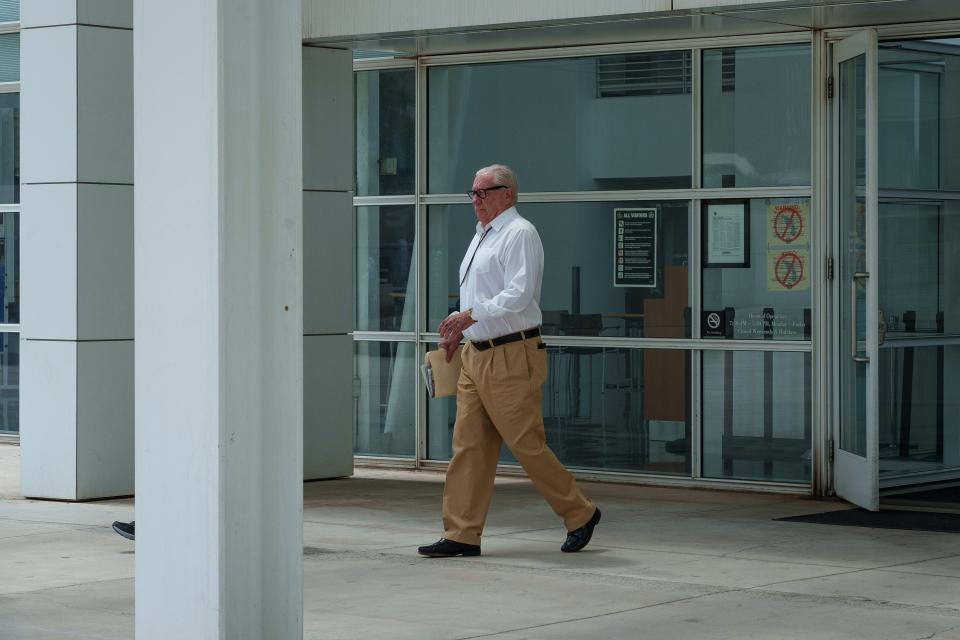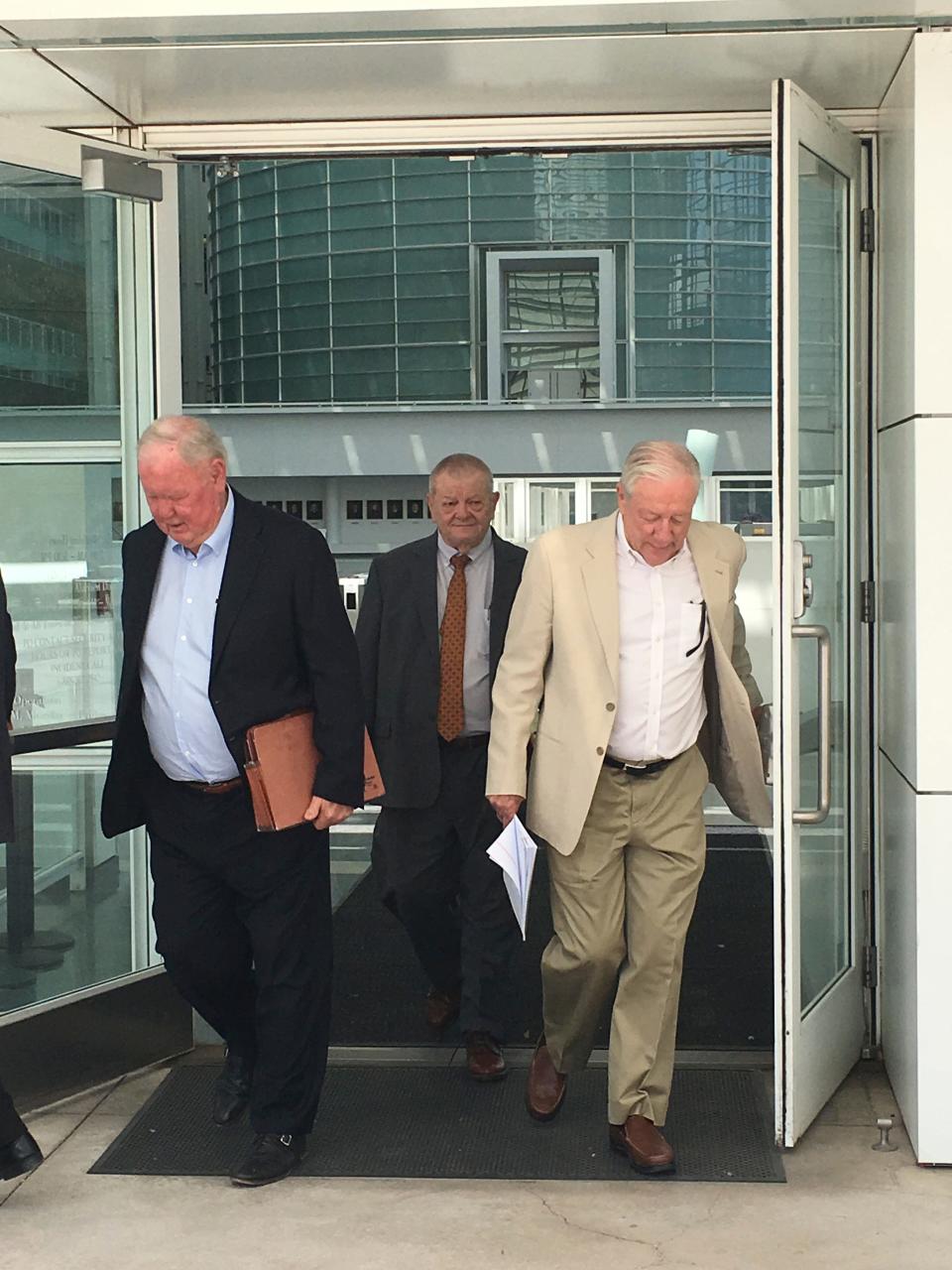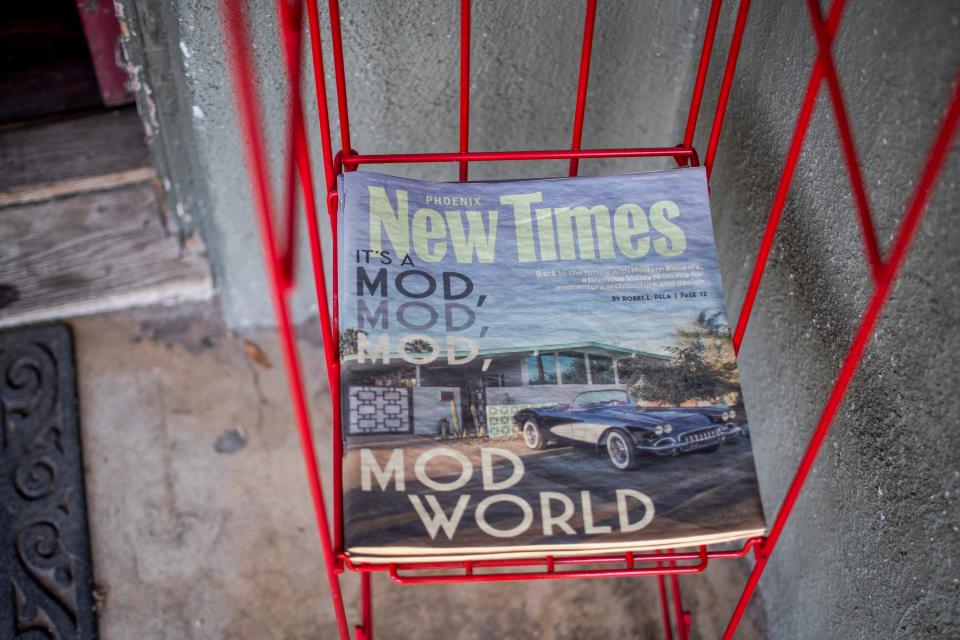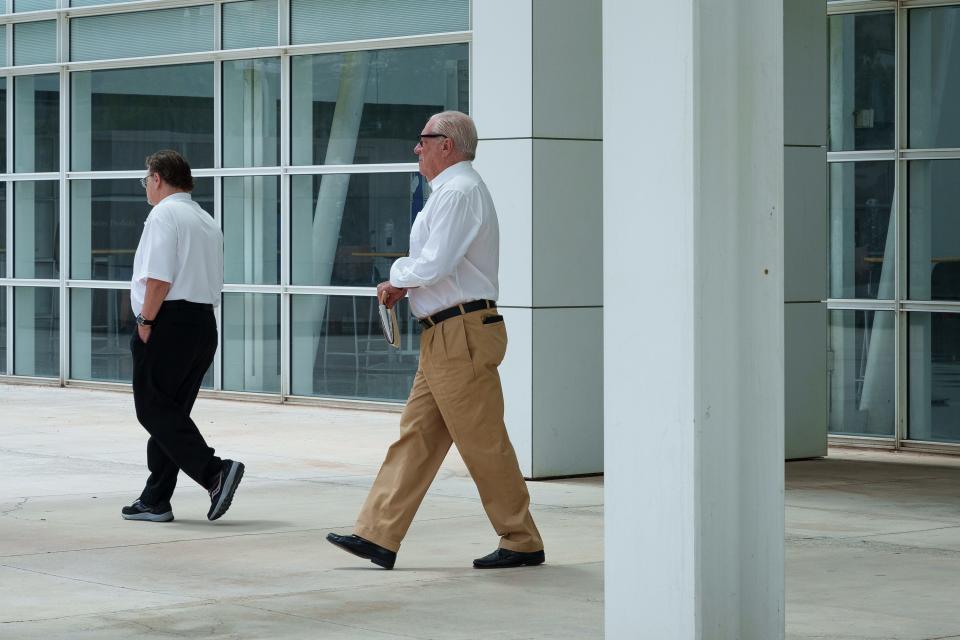Backpage trial moves closer; Michael Lacey, others reject plea deals
Days removed from the death of his longtime newspaper partner and co-defendant, former Phoenix New Times editor Michael Lacey formally rejected a plea deal from the government Friday, setting the stage for his trial on allegations that he facilitated prostitution through the Backpage website he ran.
Lacey stood before a magistrate judge at the U.S. District Courthouse in downtown Phoenix, clad in a white shirt and bola tie, and said he was rejecting the government’s offer that he plead guilty to a single conspiracy charge rather than proceed to trial on the more than 70 charges he faces related to facilitating prostitution and money laundering.
A federal prosecutor mentioned the maximum penalties for each count Lacey faced. He also mentioned the more likely outcomes, based on sentencing guidelines that judges follow.
The numbers added up quickly. Lacey was told that under the guidelines, he would face four to five years if found guilty of the first 51 counts he faced related to facilitating prostitution. He faced a likely 20 years for any money laundering charges for which he was found guilty, given the large amounts of funds involved.
The government’s deal: Plead guilty to a conspiracy charge with a maximum possible sentence of five years.
Magistrate Deborah Fine asked Lacey: “Do you still reject the plea offer?”
“Yes,” Lacey said.

Trial slated to start after death of James Larkin
Lacey started the online classified advertising website, Backpage, along with his longtime friend and newspaper cohort, James Larkin.
Larkin was also charged in the case. He died by suicide along the side of a highway in Superior, a former mining town east of Arizona, in late July.
Lacey and the other Backpage defendants had a pair of hearings on Friday, the first since Larkin's death.

The first hearing dealt with procedural issues ahead of the Aug. 29 trial. The second was the hearing during which each defendant was told of the plea deal presented and, before a judge, rejected it. That hearing, known as a Frye/Cooper hearing, is intended to ensure defendants know of plea offers ahead of trial, warding off it becoming an issue later.
Lacey's deal was the same as that for two other defendants, Scott Spear, a former executive vice president and John “Jed” Brunst, the former chief financial officer. Both Spear and Brunst rejected the plea deal.
So did two other defendants: Andrew Padilla, the operations manager and Joye Vaught, the assistant operations manager. Padilla's deal would have asked for no more than one year and one day in prison, a prosecutor said. Vaught could have avoided prison entirely and had the case dismissed entirely if she abided by certain probation terms for two years.
After the hearings, Lacey declined to speak to an Arizona Republic reporter.

Lacey and Larkin had worked together since the 1970s, starting the alternative weekly New Times. It became known for its take-no-prisoners journalism and incisive arts coverage.
Lacey was the editor. Larkin handled business. The two eventually grew the Phoenix-based weekly into a chain of alternative weeklies that was big enough to take over the Village Voice in New York, cementing their status as kings of the medium.
An employee, Carl Ferrer, saw an opportunity to expand the publication’s influence in the online world. He suggested creating a classified advertising website called Backpage, taking the name from the literal back page of the printed New Times tabloid. Classified ads printed there were sold at a premium.
The website was envisioned as a rival to Craigslist, a free classified advertising site.
Eventually, both sites were dominated by advertising for adult services. Law enforcement and anti-sex trafficking advocates said the websites buzzed with prostitution activity, though disguised as advertisements for escorts or massages.
Lacey and Larkin avoided criminal charges and civil penalties for years, with courts finding they were shielded from a law that said online publishers were not liable for hosting words written by others. That law, the Communications Decency Act, was intended to allow websites to edit or delete patently offensive content without taking responsibility for everything that was published.
But in 2017, a U.S. Senate subcommittee published a report based on emails it unearthed under a subpoena. The emails showed that Backpage employees actively moderated and edited posts. The report concluded the company did so to give a patina of legitimacy to what it knew were ads for prostitution.
In April 2018, the government indicted Lacey, Larkin and other Backpage employees. It also revealed that Ferrer had pleaded guilty on behalf of both himself and the website Backpage. Those pleas acknowledge the website facilitated prostitution.
The case went to trial in 2021 but was halted when the presiding judge called a mistrial, saying government prosecutors introduced highly emotional testimony and language rather than sticking to proving the charges.
Defense attorneys seek to ban mention of child sex trafficking

At Friday's hearing, Judge Diane Humetewa cautioned the government about using loaded terms, such as child sex trafficking, but denied a request by defense attorneys to ban the term.
An attorney for Lacey, Paul Cambria, said prosecutors likely would bandy that word around to improperly prejudice the jury. “It is very typical to try and inject children in a case like this,” Cambria said. “There is no charge (relating to) children here.”
Humetewa ruled that attorneys would have to ask witnesses to define the term as they understand it and that any use of it must relate to the charged crimes.
Much of the morning hearing involved weeding out potential jurors to get to a pool of 110 that will show up for the first day of trial. Those people will go through regular questioning about their ability to judge the evidence fairly, a process known as voir dire. Sixteen jurors will eventually sit for the trial, which is expected to stretch into November.
The Aug. 1 death of Larkin was only mentioned briefly and obliquely during the procedural hearing.
Humetewa said that potential jurors would not face automatic disqualification for saying in a questionnaire that they had heard about “the matter.” Rather, they would be asked in court whether they could remain impartial, she said.
Humetewa also referenced the empty chairs and table where Larkin had sat with his attorney during previous proceedings. The seats were located in the first of two rows of tables holding the five Backpage defendants and were closest to the bench and the podium where attorneys would speak.
The judge said another defendant should take that spot to maximize courtroom space. She suggested the group “draw straws” to determine who should take the prime location.
Reach Ruelas at 602-444-8473 or at richard.ruelas@arizonarepublic.com. Follow the reporter at @ruelaswritings on X, formerly known as Twitter.
This article originally appeared on Arizona Republic: Michael Lacey, others reject plea deals in Backpage prostitution trial

